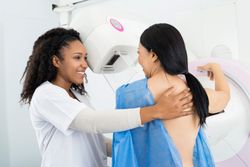5 Cancer Screening Guidelines Every Person Should Know

When it comes to treating cancer, early detection is critical. Since early signs of illness aren’t always easy to detect, Alaska Oncology and Hematology, LLC, in Anchorage reminds patients to keep up with screening guidelines. While having certain risk factors in your health history or lifestyle may require you to get screened for specific types of cancer, the following five recommendations are suitable for people with any health profile.
1. Breast Cancer
 According to the American Cancer Society (ACS), all women should perform monthly self-exams to check for irregular lumps or changes in their breast tissue. If you are a woman at an average level of risk, the ACS recommends getting annual mammograms starting around age 40. However, if you have increased genetic risk of breast cancer, your doctor may encourage you to start screening earlier in life.
According to the American Cancer Society (ACS), all women should perform monthly self-exams to check for irregular lumps or changes in their breast tissue. If you are a woman at an average level of risk, the ACS recommends getting annual mammograms starting around age 40. However, if you have increased genetic risk of breast cancer, your doctor may encourage you to start screening earlier in life.
2. Prostate Cancer
According to the ACS, men should start talking with their doctors about testing for prostate cancer around age 50. Individuals who have had family members with this form of cancer may want to start screening earlier. Your doctor may recommend a rectal exam and blood test to monitor your level of prostate-specific antigens.
3. Cervical Cancer
Unlike breast cancer screenings, which can often wait until middle age, women should start being tested for cervical cancer in early adulthood. Women age 21 and older should have a Pap smear every three years. However, once a woman reaches age 30, the ACS says they may opt to co-test with both a Pap smear and an HPV test every five years to cut down on testing frequency.
4. Colon Cancer
Men and women should begin screening for colon and rectal cancer once they reach age 50. There several methods that can detect cancer and polyps, such as flexible sigmoidoscopy and CT colonography, both of which should be done every five years. Colonoscopies, a more intensive test, can be performed every 10 years according to the ACS. There are also a few fecal tests which can detect the presence of cancer. Your doctor will discuss your health and family history to determine the best option for you.
5. Skin Cancer
Adults should check their entire bodies for signs of skin cancer—such as melanoma—about once a month. If any unusual blemishes appear, consult your doctor for further screening recommendations. You should also ask your doctor to perform skin checks during routine physicals.
If you’re concerned about your cancer risk or have recently received a positive diagnosis, the caring specialists at Alaska Oncology and Hematology, LLC, can provide further screening guidance. Backed by specialized expertise and advanced diagnostic tools, these professionals can help you gain a clearer understanding of your health and develop a personalized treatment plan. To schedule an appointment, call (907) 279-3155. Visit their website to learn more about their integrative approach to cancer treatment.
About the Business
Have a question? Ask the experts!
Send your question

